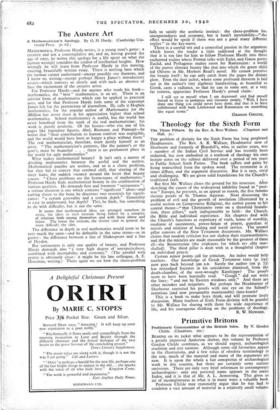The Austere Art
MATHEMATICS, Professor Hardy writes, is a young man's game: a creative and not a contemplative art, and so, having passed the age of sixty, he writes this apology for a life spent on what the layman wrongly considers the coldest of intellectual heights. How wrongly he will learn from Professor Hardy in this moving, exciting, beautifully written essay. There is nothing here which the layman cannot understand—except possibly one theorem, and I know no writing—except perhaps Henry James's introductory essays—which conveys so clearly and with such an absence of fuss the excitement of the creative artist.
For Professor Hardy—and for anyone who reads his book— mathematics, the " best " mathematics, is an art. There is an inferior form of mathematics which can be applied to practical uses, and for that Professor Hardy feels some of the contempt James felt for the pretensions of journalism. He calls it Hogben mathematics, for the popular author of Mathematics for the Million has never risen in his appreciation higher than school mathematics. School mathematics is useful, but the world has never benefited from the work of the real mathematician: his work is purely aesthetic. Of his heroes—who rise out of his pages like legendary figures, Abel, Riemann and Poincare—he writes that " their contribution to human comfort was negligible, and the world would have been as happy a place without them." The real mathematician, therefore, must justify himself as an artist. " The mathematician's patterns, like the painter's or the poet's, must be beautiful . . . there is no permanent place in the world for ugly mathematics." What makes mathematical beauty? It isn't only a matter of dividing mathematics between the useful and the useless. Mathematical puzzles are useless, and so is a chess problem, but they fail to convey that cerebral chill, that stirring of the short hairs, the sudden vacancy around the heart that beauty causes. " Chess problems are the hymn-tunes of mathematics." Professor Hardy finds mathematical beauty in the combination of various qualities. He demands first and foremost " seriousness ": a serious theorem is one which contains " significant " ideas—and cutting closer to the bone he discovers two essentials for signifi- cance: " a certain generality and a certain depth." Generality is easy to understand, but depth? This, he finds, has something to do with difficulty, but is not the same.
It seems that mathematical ideas are arranged somehow in strata, the ideas in each stratum being linked by a complex of relations both among themselves and with those above and below. The lower the stratum, the deeper (and in general the more difficult) the idea.
The difference in depth in real mathematics would seem to be very much the same—and be definable in the same terms—as in poetry : the difference between a line of Shakespeare and a line of Dryden.
But seriousness is only one quality of beauty, and Professor Hardy demands also " a very high degree of unexpectedness, combined with inevitability and economy." (The parallel with poetry is obviously close: it might be his late colleague, A. E. Housman, writing.) There again we see how the chess-problem
fails to satisfy the aesthetic instinct : the chess-problem has unexpectedness and economy, but it hasn't inevitability—': the effect would be spoilt if there was not a good many different replies " to the key-move.
There is a careful wit and a controlled passion in the argument which leaves the reader a little saddened at the thought that it is too late for him to follow Professor. Hardy into these enchanted realms where Fermat talks with Euler, and Gauss greets Euclid, and Pythagoras makes room for Ramanujan: a world of the purest abstract beauty like that into which the green child led Olivero in Mr. Herbert Read's novel. He cannot perceive the beauty itself : he can only catch from the pages the distant glow. Even the dust jacket, where some profound theorem is laid out in the author's tiny algebraic handwriting, as beautiful as Greek, casts a radiance, so that he can in some sort, at a very far remove, appreciate Professor Hardy's proud claim: I still say to myself when I am depressed and find myself forced to listen to pompous and tiresome people, " Well, I have done one thing you could never have done, and that is to have collaborated with both Littlewood and Ramanujan on something like equal terms."
GRAHAM GREENE.


























 Previous page
Previous page